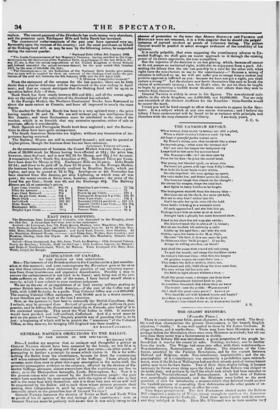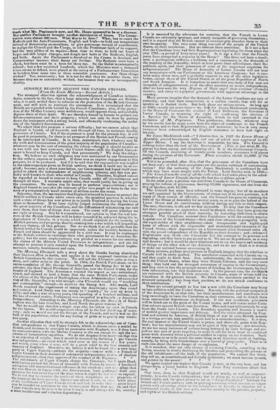THE SHABBY MINISTERS.
[From the Times.]
There is sometimes great force, great character, in a single word. The forci- ble word that characterizes the present Government, is the homely English adjective, " shabby." Is was well applied to them by Sir James Graham. It clings to them, and it marks them. There may have been Ministers as weak, perhaps before the Revolution there were even Ministers as wicked; but till our own time there never was a Government so shabby. When the Reform Bill was introduced, a great proportion of the people be- lieved that it was for the courneys sake. Nothing, we fancy, can be further from the truth. The Whigs had come into office with three watchwords,-.-• Nun-interference, Retrenchment, and Reform. The situation of the Con- tinent, unsettled by the Parisian Revolution, and by the contest between Holland and Belgium, made Non-interference impracticable; and the im- practicability of nun-interference was necessarily a prohibition upon retrench. meet, even if the Duke of Wellington had not then already pushed retrenchment pretty near to its furthest limits. Two of their three staples falling, it became necessary to throw every thing upon the third ; and thus Reform was obliged to do treble duty, and perform by itself the whole task which had been intended to be shared by Non-interference and Retrenchment. A treble dose of Reform was accordingly administered ; and the Ministers were hailed as the most patriotic of men for introducing a measure which they believed would answer the twofold purpose of concealing their deficiencies on the other points of ex. peetation, and fixing their party in office for ever. They began prosperou-ly. The tint Parliament elected under the Reform Bill comprised a majority of Whigs, strong enough to overbear the Conserva- tives and to disregard the Radicals. Then their natural pride took its course, and they indulged it freely. Then Mr. O'Connell was iu their mouths very
math What Mr. Papineau is now, and Mr. Hume appeared to be at a discount. But Wither Parliament brought another distribution of fortes. The Cower. vatives were almost 300 men. What was to be done? Whet, but to court the Radicals and the Anti•Protestants, English and Irish—to hold out temptations instead of threatening prosecutions, to give patronage instead of punishment, to malign the Church and the Clergy, to rob the Protestant faith of its support, 'sod the very edifice of its repairs—from time to time, to hold out hopes of larger and still larger changes, and dangle new baits at the Radicals, English and Irish. Again the Parliament is dissolved as the Crown is demised, and Conservatives increase their forces yet further. The Radicals must have a check, but there mast be a boon for them too. So the Ballot is peremptorily refused ; but a few wretched hundredth which the Ministers were a thousand times sworn to defend, were placed at the mercy of a Parliamentary Committee to be taken from some two or three miserable pensioners. Are these things wicked? Yes, notoriously ; but it is not for this that we mention them, not because they are so notoriously wicked, but because they are so incomparably shabby.



























 Previous page
Previous page